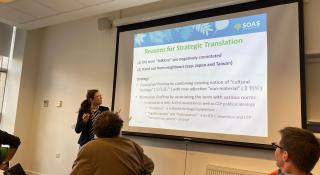
Breadcrumbs navigation
Race and systemic crises in international politics: An agenda for pluralistic scholarship
In this short summary video author Andrew Rosenberg discusses his key arguments from his new Review of International Studies article - ‘Race and systemic crises in international politics: An agenda for pluralistic scholarship.'
Want to know more? You can read the full article at DOI: https://doi.org/10.1017/S0260210523000761
This particular article is open access, however BISA members receive access to all articles in RIS (and our other journal European Journal of International Security) as a benefit of membership. To gain access, log in to your BISA account and scroll down to the 'Membership benefits' section. If you're not yet a member join today.
Abstract
In recent years, scholars of global politics have shown that issues of race and white supremacy lie at the centre of international history, the birth of the field of International Relations, and contemporary theory. In this article, I argue that race plays an equally central role in the 21st century’s current and future crises: the set of systemic risks that includes intensifying climate change, deepening inequality, the endemic instabilities of capitalism, and migration. To make this argument, I describe the contours of the current crisis and show how racism amplifies its effects. In short, capitalism’s winners and losers and the effects of climate change fall along racial lines, amplifying both direct and indirect racial discrimination against non-white migrants and states in the Global South. These interdependent crises will shape the next 50 years of international politics and will likely perpetuate the vicious cycle of global racial inequality. Accordingly, this article presents a research agenda for all IR scholars to explore the empirical implications of race in the international system, integrate marginalised perspectives on global politics from the past and present into their scholarship, and address the most pressing political issues of the 21st century.
Photo by Clay Banks on Unsplash


